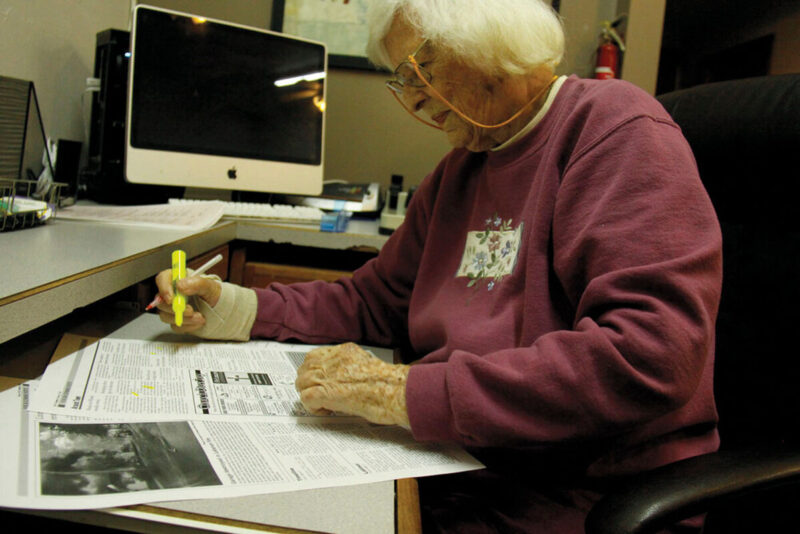Benny Westcott
The New Era’s fortunate to have a feature not many other newsrooms can brag about: a 92-year-old, very exacting traditional proofreader.
Every Monday afternoon, Joan Scofield drives the 10 minutes from her longtime home on Pleasant Valley Road to the newspaper’s Main Street office to check that week’s edition before it goes to press. It’s something she’s done most Mondays since October 2006, and she’s still going strong.
“She has been here nearly every week, showing up to read through the paper and alert us to all the misspellings and typographical problems that she could detect,” Editor/Co-Publisher Scott Swanson said.
Scofield’s association with The New Era actually began in the late 1970s, when the wordsmith was already lamenting times gone by, harking back to an age of perfectly proofed publications, at least in her memory.
“I thought, ‘Newspapers are supposed to be perfect,'” she said. “And I would never find errors in Reader’s Digest.”
Even modern linguistic lifesavers like the “spell-check” function aren’t necessarily a full- er, fool-proof solution.
“Now, even expensive new books have a few errors,” she said. “Spell-check doesn’t catch them all.”
Unsurprisingly, when she read The New Era in the ’70s, she noticed typos here and there.
So she sent Dave Cooper, its then-editor, three messages in the space of little more than a year, asking, essentially, “Don’t you have proofreaders?”
At first there was no response, but then Cooper phoned her with a part-time proposition, and Scofield worked at The New Era for 8½ years as a phototypesetter, coming in a couple of afternoons a week from 1977 until 1985, when Cooper sold the paper to Alex Paul and his wife, Debra.
After that stint, she worked briefly for the Pauls until computers made the phototypesetting role obsolete, she said. She left in August 1986, only to resurface not long after the Pauls sold out to current owners Scott and Miriam Swanson in 2005. She saw a need for her services again.
“She informed us that she thought we needed a proofreader and volunteered to do that,” Scott said. We took her up on it. She has been immensely helpful for us in producing a better-quality newspaper. We appreciate her in many ways. It is not uncommon to hear someone around here say, ‘That can’t go to press until Joan sees it.'”
Scofield brings many years of experience to the work.
“She understands newspapers, having worked here on and off for decades,” Scott said.
The 92-year-old goes deep into her memory vault to give credit for her abilities.
“I had a great third-grade teacher,” she said. “The way she taught, I really understood spelling rules and punctuation. I really got it. I’ve always been a good reader. I’ve always enjoyed that.”
Scofield has overseen books by many local authors, including Frank McCubbins, David Larsen, Mona Waibel, Corinna Dominy, and Daniel and Abigail Helland.
“She does a wonderful job proofreading, and she works on my limited skills in the English language,” said Larsen, who has appreciated Scofield’s services in the four memoir-style books he’s written of his many years as a veterinarian.
Still an avid reader herself, Scofield enjoys history – particularly Oregon’s – as well as psychology and books about missionaries. She’s also an aspiring author herself, having written about her life’s adventures in a rough draft she calls “Gallivantin’ Granny.”
But since moving to the area in 1973, she’s been active in the community beyond dotting and crossing of “i”s and “t”s. She volunteered for Meals on Wheels for 20 years, delivering food to seniors’ doorsteps. For 18 months, she assisted the Retired and Senior Volunteer Program, driving elderly people to doctor’s appointments and for dialysis. Scofield also visited and read aloud at the Wiley Creek Community retirement home for six years, and corrected and helped produce Sunday bulletins for the Mennonite Church for a dozen years. These community-minded efforts resulted in a Very Important Person award at the Sweet Home Chamber of Commerce’s annual community awards banquet in 2014.
“Sitting around and playing bridge all week doesn’t appeal to me,” she said. “I’ve never joined the senior center, because that’s my stereotype. Whatever it is they are offering isn’t appealing to me at the moment.”
Born in Burbank, Calif., Scofield moved to Southern Oregon with her family when she was three. Later, they relocated to the Salem area, where Scofield went through junior high school. Subsequent moves led to Canby High School, then, finally, Salem High, where she graduated in 1947.
She attended Willamette University, then moved to Northwestern Schools in Minneapolis, Minnesota (now the University of Northwestern, St. Paul), graduating with a bachelor’s degree from its College of Liberal Arts in 1951. There, she “learned what the Bible was about” and became a Christian, a conviction she’s shared ever since.
She married Richard Scofield in 1951. Two years later, the couple moved to Southern California’s San Fernando Valley, where she was a stay-at-home mom, raising her six children. The family moved to their current home on Pleasant Valley Road in 1973.
Fifty-four sheep roamed the property between 1973 and 1988. Now, Scofield lives there with one of her sons, Douglas. (Ex-husband Richard died in 2009, about 32 years after their divorce.)
The stories in “Gallivantin’ Granny” come from her time working and globetrotting for Wycliffe Bible Translators. Scofield helped get Bible translations for non-English speakers printed and worked to get its message to people who hadn’t been exposed to it.
She first volunteered for the Florida-based nonprofit in 1979, traveling to Colombia with her son Stuart, then 16. She returned to the country for two months in 1982, then headed to Papua New Guinea for three years.
She was so enamored with the work that she went full-time as a volunteer typist for Wycliffe from 1986 to 1996. The globetrotting continued.
She spent time in Wycliffe’s Huntington Beach, Calif., administrative offices, then Australia and New Zealand. She also worked for the organization in Dallas, Texas, the Philippines and eastern Peru.
“As a guest helper I could go to many countries where needed, as a fill-in for the gaps between long-term regular members,” Scofield said. “I was not an experienced traveler, but Wycliffe takes very good care of their people.
“I was never in danger, even from M-19 (the 19th of April Movement that later became the M-19 Democratic Alliance, or AD/M-19, political party) guerrillas in Colombia.
“I really enjoyed my time with Wycliffe,” she added. “I have gone to a lot of churches before and since, and there is just not the fellowship that there was with Wycliffe. It’s just a special breed of people.”
These days Scofield doesn’t travel nearly as much, though her front room still holds plenty of mementos from all the far-flung places she’s visited. She gets exercise mowing her yard, which takes about two and a half hours or five days when broken into half-hour-a-day segments.
Crocheting, a hobby she took up at age 10, occupies much of her time, as she enjoys making caps and doilies. She crafted 15 doilies for the wedding of one of her 24 grandchildren last August, setting the finished works on guest and refreshment tables.
“The New Era is my excuse to go to town once a week,” she said. “Otherwise, I live in my recliner to read, proof or crochet.”
And while this article may have reached its “-30-” (printer’s lingo for “end”) it can’t go to press until she sees it.




